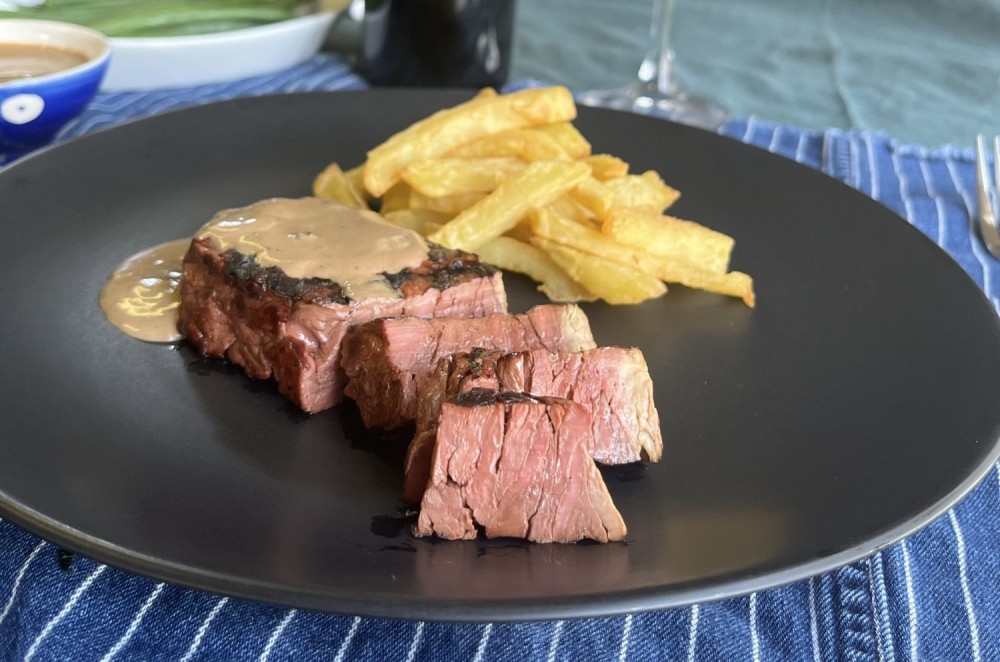Ordering a Mycelium Steak Soon to be be a Gourmet Experience
Adamo Foods is a startup that’s moving fast. Driven by the passion of its founder and CEO Pierre Dupuis, who describes himself as a foodie, environmentalist and animal lover, the company’s aim is to market a realistic and tasty meat-alternative that meat eaters would happily order in a restaurant or pop into their shopping trolley instead of prime whole cuts such as steak.
“A lot of meat-alternative products tick the environmental box and are better for animals but are ultra-processed, so not as healthy as they claim to be. I believe consumers have been let down. My vision is to create a much healthier, more transparently labelled product that is much more realistic in texture and taste.”
To make that happen, Adamo Foods was started just three years ago with a mission to create whole cuts of alternative protein in a more sustainable way than traditional agriculture produces meat. Instead of a processed product, the company is using fungal fermentation to produce a realistic alternative protein with a structure that mimics animal muscle. Rather than being a cocktail of artificial ingredients, the meat look alike is made using a small number of natural ingredients.

Although biomass fermentation isn’t a new technology, Adamo Foods has raised the bar in terms of quality from a consumer perspective. Its innovation is a now patented process that gives a unique structure to the fungus by precisely controlling fermentation parameters.
The road to net zero
The driving force behind the founder’s vision is to help gradually decrease meat consumption and in so doing, reduce a major source of greenhouse gas emissions in agriculture. Animal agriculture contributes over 50% to UK methane emissions, a greenhouse gas 22 times as potent as carbon dioxide.
“Fungal fermentation has a small carbon footprint and provides an efficient and renewable way of producing protein at scale, without a need for external imports,” explains Mr Dupuis.
Contrary to the old proverb: ‘If you want to go fast, go alone. If you want to go far, go together’, Adamo Foods has progressed both fast and far in just a few years and it has been very much a team effort.
“Adamo Foods is really fortunate to have an amazing team of really smart people and that has been critical for us. The competence to develop our fermentation technology came from working with some of the leading scientists, mycologists, and R&D institutions. Along with my commercial background, it’s provided an ecosystem that allows us to be at the forefront of cutting-edge technologies,” he explains.
Public-private finance
But as with any startup business, it hasn’t all been plain sailing. “It’s very difficult to find investors without a product and in the early stages we literally talked to hundreds of investors and most of the time our approaches were rejected. But we kept on going.”
In 2022, Adamo Foods successfully pitched to the investment panel of the SHAKE Climate Change accelerator programme – a consortium led by Rothamsted Research that brings together experts from the agricultural research institution and leading universities in the sector, Cranfield University, University College London and the University of Hertfordshire. The programme awards funding and mentorship to companies that provide climate positive solutions in agriculture and food production
“SHAKE was one of the early-stage programmes that helped provide initial financial support to Adamo Foods. As well as the mentorship aspects of SHAKE, it helped guide us in how to be more competitive in raising funds, which was invaluable advice. Participating in SHAKE also helped directly as it became one of the initial investors in the company, validating the business as an investment opportunity,” explains Mr Dupuis.
Public funding grants from Innovate UK also played a significant role in supporting the early-stage company, he adds. “We’ve received four grants from Innovate UK – a Smart grant, Better Food for All, and two Novel Low Emissions Foods grants, the second requiring match funding by a private investor. We’ve also received RTO and EIT grants.”
The early financial support available has allowed the company to focus on its product quality and IP development, providing a foundation to attract private angel investors and venture capital funding.
“Later this year and into 2025, we’ll be launching a pilot programme partnering with a restaurant or food service outlet while we scale-up supply chain operations for nationwide distribution.”

The road to Net Zero
To achieve net zero targets, government needs a coherent strategy to reduce the consumption of red meat and reinforce investment in alternative protein sources, suggests Mr Dupuis.
“It would be helpful for government to provide subsidies or other support that is more balanced between conventional agriculture and emerging alternative technologies, in line with the country's climate goals of reducing meat consumption over time.”
Given their potential impact, it makes sense to increase investment and funding for alternative protein companies, he says, highlighting that there are many unexplored opportunities in this space. “There is still so much potential for new innovations and discoveries that could sustainably feed the population. Hundreds of organisms remain unexplored for their protein production capabilities.”
With interest from overseas investors as well as a healthy backing in the UK, ordering a mycelium steak in a restaurant could soon be a gourmet experience.